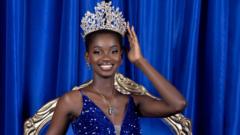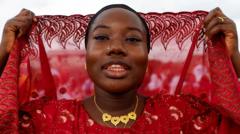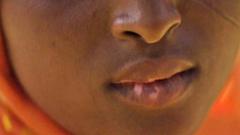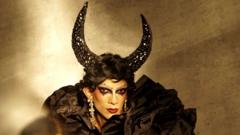The Miss Ivory Coast pageant has made headlines by banning wigs, weaves, and extensions, encouraging contestants to showcase their natural hair. This move aims to celebrate African beauty and empower women but has sparked a debate on personal expression in beauty standards.
Natural Beauty Takes Center Stage in Ivorian Pageantry

Natural Beauty Takes Center Stage in Ivorian Pageantry
Ivory Coast introduces groundbreaking rules banning wigs and weaves in beauty pageants, promoting natural hairstyles and redefining beauty standards.
In a significant shift towards embracing natural beauty standards, the Miss Ivory Coast pageant has introduced new regulations banning wigs, weaves, and hair extensions from preliminary competitions. This change comes in a country where artificial hairstyles have long dominated beauty events, and where women often spend considerable sums on their appearance.
Marlène-Kany Kouassi, who won the Miss Ivory Coast title in 2022 with her natural hair, remains a rare exception in this predominantly wig-friendly environment. As pageant organizers, led by Victor Yapobi, aim to promote a more authentic representation of beauty, many contestants are welcoming the new rule. "Beauty must be raw," Yapobi stated, asserting a desire to prioritize contestants' natural looks over conventional beauty standards.
The recent changes extend beyond hair, allowing shorter contestants to compete and raising the age limit to 28, while reducing participation fees. Many participants at a recent preliminary event felt that the new regulations empowered them, with 21-year-old contestant Emmanuella Dali expressing newfound pride as an African woman without relying on wigs.
However, the rule's introduction has sparked heated discussions across Ivory Coast, a country where wigs are "fashionable" and often viewed as a creative form of personal expression. Some contestants, like 24-year-old Astrid Menekou, initially felt conflicted about the ban but later embraced the opportunity to showcase their natural beauty.
While industry professionals voice concerns over reduced demand for wigs and extensions, potential economic impacts loom as the hair industry, worth over $300 million annually, faces uncertainties. Amid the ongoing natural hair movement, there’s an evolving dialogue about beauty expectations in the region.
As local and international reactions pour in, Yapobi remains optimistic about the initiative. Awaiting the finale of Miss Ivory Coast 2025, he hinted that if this year's response remains favorable, the rules may be upheld in the future. Contestants like Doria Koré and Emmanuella Dali, regardless of their placement, are leaving the competition feeling empowered and validated in their natural selves. With more women celebrating their unique looks, society may slowly shift toward a more inclusive understanding of beauty.
This evolving narrative within Ivorian pageants reflects a broader trend of self-acceptance and the re-examination of beauty ideals in the context of African heritage.
Marlène-Kany Kouassi, who won the Miss Ivory Coast title in 2022 with her natural hair, remains a rare exception in this predominantly wig-friendly environment. As pageant organizers, led by Victor Yapobi, aim to promote a more authentic representation of beauty, many contestants are welcoming the new rule. "Beauty must be raw," Yapobi stated, asserting a desire to prioritize contestants' natural looks over conventional beauty standards.
The recent changes extend beyond hair, allowing shorter contestants to compete and raising the age limit to 28, while reducing participation fees. Many participants at a recent preliminary event felt that the new regulations empowered them, with 21-year-old contestant Emmanuella Dali expressing newfound pride as an African woman without relying on wigs.
However, the rule's introduction has sparked heated discussions across Ivory Coast, a country where wigs are "fashionable" and often viewed as a creative form of personal expression. Some contestants, like 24-year-old Astrid Menekou, initially felt conflicted about the ban but later embraced the opportunity to showcase their natural beauty.
While industry professionals voice concerns over reduced demand for wigs and extensions, potential economic impacts loom as the hair industry, worth over $300 million annually, faces uncertainties. Amid the ongoing natural hair movement, there’s an evolving dialogue about beauty expectations in the region.
As local and international reactions pour in, Yapobi remains optimistic about the initiative. Awaiting the finale of Miss Ivory Coast 2025, he hinted that if this year's response remains favorable, the rules may be upheld in the future. Contestants like Doria Koré and Emmanuella Dali, regardless of their placement, are leaving the competition feeling empowered and validated in their natural selves. With more women celebrating their unique looks, society may slowly shift toward a more inclusive understanding of beauty.
This evolving narrative within Ivorian pageants reflects a broader trend of self-acceptance and the re-examination of beauty ideals in the context of African heritage.
















